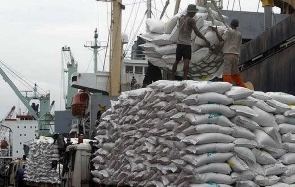The Acting Commissioner General of the Ghana Revenue Authority, Rev. Ammishaddai Owusu Amoah has stated that Value Added Tax is not charged on goods meant for transit.
“We don’t impose VAT on transit goods. Once it is leaving the country, we don’t,” he said.
The GRA boss said this in the wake of the transit community’s persistent discontentment with the 17.5 VAT fee they had described as unjustifiable.
He said this on Eye on Port’s live interactive platform, on the topic: ‘Revenue Mobilization Goals: Assessing Policies and Addressing Variances’.
On the concerns of traders of the transit community asking for extensions in the period allowed for transit vehicles on the Ghanaian corridor, the GRA boss said the GRA will consider adjusting its policies if ongoing deliberations conclude that the adjustment would improve trade and wouldn’t hurt revenue generation.
“As part of the community, especially considering that we are fortunate to be having a sea port, we have to promote trade within the sub region.
So whenever, the customs working groups during their discussions come up with a decision, we will move with it,” he said.
He said the GRA has deployed improved ways of tracking cargo meant for transit and are continuing to assess and improve existing methods.
“We are going to improve the entire tracking mechanism to ensure that they are effective as possible. Secondly, we are also using video via CCTV and attaching them to the tracking mechanisms.” he disclosed.
He also said the first port rule which would require duties to be paid on transit goods at the port of discharge, as a revenue retention intervention is still under consideration to be implemented.
“We thought that why don’t we have a system where the tax is taken from the first port, so far as the land is concerned, whether transit or not transit, before they get to the second country. We are yet to implement this. We are having several discussions,” he shared.
Touching on auctioned goods and vehicles, he added that auctioning would be improved to bring satisfactory results to the state and importers of goods and vehicles, and revealed that e-auctioning would be introduced to reduce discretion in auctions.
He explained the need for auctioning of goods saying beyond it being a revenue retrieval measure, it is meant to help decongest the port of uncleared cargo. “The ability of goods to move quickly through the port attracts more business for the port,” he said.
Business News of Thursday, 23 January 2020
Source: Eye on Port

















